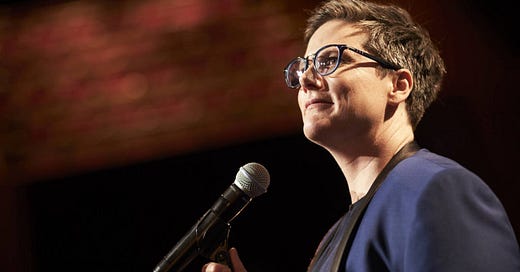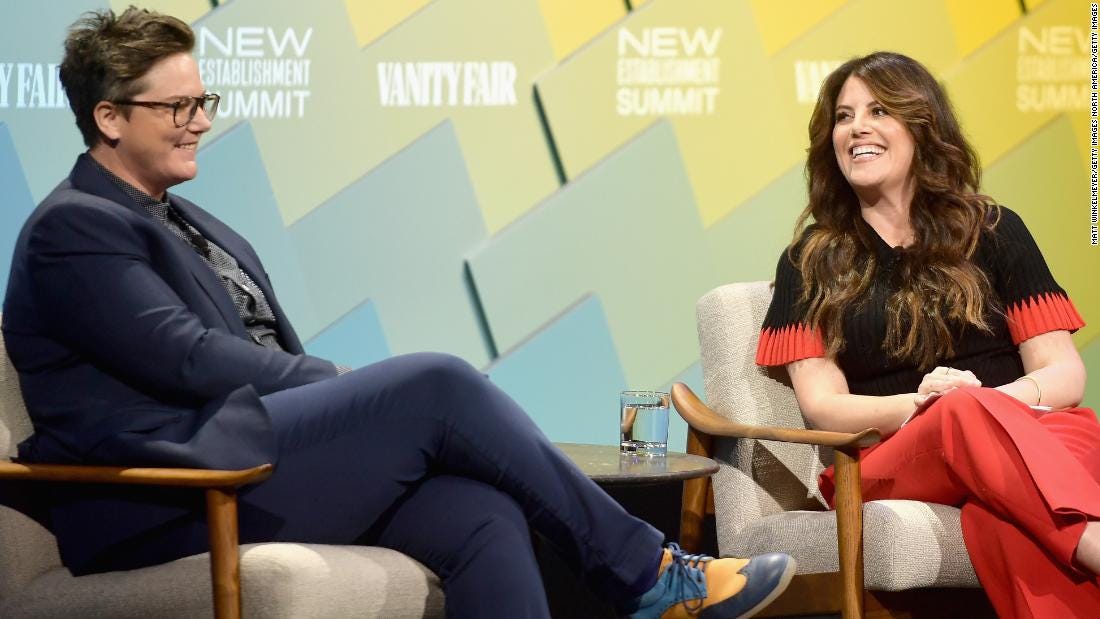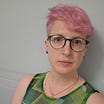“There is never a straight line to be found through a life punctuated by trauma.”- Hannah Gadsby, Ten Steps to Nanette
Usually, the Survivors on Screen series focuses on how sexual violence is portrayed in TV and film but today I’m sharing something a little different: a conversation with neurodivergent writer
about Hannah Gadsby’s ground-breaking comedy special, Nanette. It won an Emmy, a Peabody, and the Best Comedy Show award at the Edinburgh & Melbourne comedy festivals and is one of the most innovative stories about trauma that I’ve ever seen.Huge thanks to Aisling for having this conversation with me. In her newsletter, she writes about exploring autism and neurodivergence through cinema’s oddballs, misfits & rebels. It’s a great read and I highly recommend you check it out.
Clare Egan: I’m interested in how Gadsby took the traditional stand-up comedy format and transformed it into something entirely unique. I really admire their ability to take a structure that’s been the same for decades (& mostly practiced by men) and reimagine something new within its confines.
Aisling Walsh: I must admit I’m not a huge fan of stand-up, there were very few comedians outside of the queers and the weirdos (I’m thinking Eddie Izzard or Bill Bailey) that I would sit down and watch in my teens or twenties, and even fewer women who came up on my radar. The scene was dominated, as far as I could tell, by straight, white men who got away with far too much misogyny, racism, ableism, transphobia, and fatphobia, as if anything outside of their own narrow experience or anything they failed to fully comprehend was potential joke material, always punching down. It was so off-putting, even as a teenager. I know there were other comedians out there challenging those norms but they rarely made it onto mainstream terrestrial television.
CE: I really relate to this. I think I was in my twenties before I even considered that a woman or non-binary person could be on stage commanding the audience’s attention and making them laugh.
AW: It has and is changing, and Hannah Gadsby seems to be a big part of that right now, especially for gender-nonconforming and autistic people. Then there are people like Mae Martin, Fortune Feimster, and Tig Notaro, not to mention the wonderful comedians featured in Gadsby’s most recent show, Gender Agenda. I hadn’t heard of most of these comedians before but I particularly enjoyed Alok, Asha Ward, and Mx. Dahlia. The line-up speaks well to the future of comedy.
I guess Gadsby holds a particular spot in my heart because I owe them my autism diagnosis. But before I get into that, Gadsby came onto my radar when Nanette launched on Netflix and many women I knew began tweeting ‘You have to watch this show.’ It was a revelation.
Something about their narrative style, their ability to construct an argument and weave seemingly disparate threads together, the honesty and vulnerability of that show, I think really did strike at the zeitgeist of a #metoo world where the narratives around sexual violence were changing.
Gadsby seemed empowered in part by that movement, and their recent ADHD/autism diagnosis, to change the narrative about themselves. For me, it’s not just about how survivors tell stories but about how, as autistic people, we can express ourselves in a way that feels authentic but also meets our needs.
CE: Yes, both of their identities (as an autistic person and a survivor of sexual violence) contributed to making a revolutionary piece of art. In their book, they describe Nanette as “stand-up catharsis” which, to me, minimises the artistry of it. They don’t just blurt out their experiences as catharsis implies, Nanette is a very delicately-constructed, complex piece of work. Watching the show, which I know we’ve both seen multiple times, I have the feeling that I’m watching a master at work. Someone who understands the tools and purpose of their work differently from their peers and it’s hard not to attribute that, at least in part, to their neurodivergence.
AW: I think the way Nanette is constructed is deeply reflective of a neurodivergent thought process. I also think it is highly significant that Gadsby took elements from previous shows and retold them, not just as a survivor but as a neurodivergent person. Their coming-out story is the one that always sticks out in my mind and the pain and trauma that was hiding behind the punchline.
Nanette is not a trauma dump though, it is as much about the way we tell the story of our own lives, the jokes we have to make to survive the pain, and what it means to share the truth of our experience, as well as stories we usually refuse to listen to.
Of course, I only realised most of this after reading their memoir, by which point I had already seen Nanette at least three times. Gadsby had been diagnosed with ADHD and subsequently autism just before making Nanette and I don’t think this is incidental. Those kinds of diagnoses, particularly later in life are world-shifting occurrences. It’s a revelation to finally understand why you have felt like a lost and confused alien imposter among the humans for most of your life. Everything you’ve done, everything you believe about yourself and who you are comes under scrutiny. You pick apart your life and relationships from the most trivial to the most significant events and interactions and I think Nanette is a product of that process.
We are watching, in real-time, someone reconstruct the narrative they have written about themselves and shared with the world because they finally understand who they are and why their mind and body work the way they do. In all the criticisms that came after Nanette, this was rarely, if ever, accounted for.
I think Nanette is about processing trauma, reflecting on the medium Gadsby has found for creative expression, and reconstructing a narrative about themselves. The shows that came after, Douglas and Something Special, are closer to what I would call Autistic Joy. Douglas is like an explanation and demonstration of autism from beginning to end and Something Special is a celebration of relationships and that it is possible to fall in love and sustain fulfilling relationships, two things which are often considered impossible for autistic people.
CE: Which, of course, is a very ableist framework. Let’s talk about how they share their experiences of sexual trauma with the audience. I’m in awe of the courage it took to talk about sexual violence in a format where you want people to laugh. Other comedians have done stand-up about sexual violence (I’m thinking of Cameron Esposito, in particular) but it is a very risky environment to be vulnerable in, and yet they do it masterfully. It’s also interesting to consider this in the context of an Irish campaign to address the “undertone of sexual violence” in Ireland’s comedy scene.
AW: I do not consider myself a survivor of sexual violence, but I come from a home where abusive dynamics were very present and many people close to me are survivors. Much of my work in Guatemala and during my PhD was about how we can not only survive devastating violence but encounter possibilities for healing and thriving in the aftermath of abuse. In these contexts, storytelling and the opportunity to see your story reflected in the experience of someone else is one of the most powerful tools for healing. When I first saw Nanette, this is what most struck me.
Gadsby experienced a significant backlash last year for the Pablomatic exhibition and their professed hatred of Picasso with all the calls to separate the art from the artist. But watching Nanette, I felt legitimised for the first time in my life in turning away from the work of powerful men who hurt women and girls in the process of making art. I grew up in the art world and was taught to idolise the likes of Picasso, the abusive misogynist, or Egon Schiele, the child abuser. It was refreshing to see someone with a popular platform say: fuck them and their art.
Then there is the personal story at the heart of Nanette: the child abuse they mention but refrain from describing in detail. It’s so moving to watch that back now and realise that Gadsby was not only disclosing this to the world but to their mother as well. I think it’s also important that Gadsby is open about the impact of trauma while also refusing to let it define themself or their story. On the one hand, there is a poignant line where they say “I will never thrive” and on the other, one of the most quoted lines: “There’s nothing stronger than a broken woman who has rebuilt herself.”
CE: I love this line. It’s been so deeply embedded in my brain that I thought it was from some historical figure. But no, it’s from 2018. Audiences responded to the trauma they shared very generously, at least in the recorded version. Gadsby later joked that if they knew trauma was going to be so popular, they would have spread it out more! For me, there is something powerful about owning our narratives regardless of how people respond to them. You mentioned a similar idea in our email correspondence. Part of the power of creativity is that it allows us to reclaim the things that were done to us, and metabolise them in a new way.
AW: We expect survivors to be a certain way, tell a specific story in a way that allows us to believe it could never happen to us when in fact I suspect most women have been directly or indirectly touched by violence. Another thing that is rarely mentioned about Nanette, is how vulnerable autistic people are to abuse of all kinds because we tend to take people at face value, misread social cues, and are vulnerable to manipulation in general.
CE: This is a very important point. Sexual predators are skilled at targeting the people who appear more vulnerable, for whatever reason. There are lots of protocols in place for safeguarding children from sexual predators, but I’ve never heard of anything that was designed with neurodivergent children (or indeed adults) in mind.
You’ve written about the role Nanette played in your autism diagnosis. You describe how it acted as a mirror to your own experiences and helped you better understand aspects of yourself. For many neurodivergent people diagnosed in adulthood, there is a period of reinterpreting or even re-narrativising their experiences. This is also common among survivors of childhood sexual violence (including myself) who have to find a new way to understand their personal histories.
AW: It was actually Gadsby’s follow-up show Douglas that led me to suspect I was autistic, but I think something about Nanette already laid the groundwork. In the neurodivergent community people often say that neurodivergent folks are often drawn to each other unconsciously, even if we are undiagnosed, and in my case, this has proved true on multiple occasions. I can only conclude that something about Nanette spoke to me on a level that was beyond just the story of trauma and survivorship that was then confirmed in Douglas. But I was so far from the truth of my own neurology it took me another year and a half to realise that I too could be autistic. Rewatching Douglas since my diagnosis I could see the multiple resonances with my own experience, that on the first watch, I had missed because there is so much confusion before diagnosis. It can be hard to separate autism from trauma, grief, or anxiety, particularly as there is often a crossover in terms of ‘symptoms’, and living as an undiagnosed/unidentified autistic person for so long produces its own trauma, grief, and anxiety.
Gadsby’s memoir was a very enjoyable read that shone a whole new light on their approach to comedy, the development of Nanette, and how their diagnosis has helped them understand that they are not a failure as a person, but someone who thinks, feels, and experiences the world differently.
CE: I loved the book, and recommend it to anyone interested in exploring these issues in more detail. I also got a lot from this conversation between Gadsby and Monica Lewinsky who asked about the experience of creating content out of trauma, and particularly the tension around therapy requiring a “single story” but how their show disrupts that.
AW: I was so glad you shared this video! I hadn’t seen it before. I guess I hadn’t really thought about Monica Lewinsky since the original scandal broke, but I was only about 11 or 12 so I mostly remembered the rampant misogyny at the time, the lack of accountability for Bill Clinton, and how Monica became a punchline. I also highly recommend the You’re Wrong About episode on Monica Lewinsky which helped me understand how she was maligned and scapegoated by a political and media apparatus that cares little for women and girls.
It was wonderful to watch this conversation and see how these people who have experienced very private and very public trauma have managed to regain control of the narrative about themselves. I think this conversation speaks to the alternative forms of justice survivors can create by and for themselves through narrative, by speaking truth to power in a system where legal justice, more often than not, fails the needs of survivors.
The conversation in itself could be considered a transformative act because the shame and silence around sexual violence are supposed to keep us from speaking to and connecting with other survivors, from realising that our experiences are not isolated incidents but symptomatic of systemic issues around the exercise of power and the exploitation of vulnerable people. They also show that trauma is not the only story, that it is possible to live a life that is not defined only by trauma, that seems to be a story survivors are rarely allowed to tell about themselves. They have to be perfect victims, and Monica was by no means a perfect victim, but that does not make her story any less valid.
CE: Yes! This really taps into the mission of Beyond Survival: there is power and community among survivors. Gadsby’s & Lewinsky’s experiences are very different, but they can still relate to each other very deeply as survivors of sexual harm.
Thanks so much for being here, Aisling. I’ve really enjoyed this conversation.
Thank you for suggesting this chat Clare, and for creating this space for survivors!
💕 If this piece resonated with you, please tap the heart below to help spread the word.
💬 Have you seen Nanette? How were you impacted by the show, and Gadsby’s work in general? Let’s chat in the comments!
💰If you find value in my work, consider becoming a paid subscriber. For a few quid every month, you can make my career more sustainable.
Regardless of whether you’re a free or paid subscriber, I am grateful for your time and attention.
BIBLIOGRAPHY
Aisling’s substack, Autcasts
The Hannah Gadsby “Discourse” and Autistic Culture, by Aisling Walsh
Ten Steps to Nanette, by Hannah Gadsby (Here’s an extract from the book about their autism diagnosis).
Gadsby’s TED talk, entitled “Three ideas. Three contradictions. Or not.”










Great to see this go live Clare, so glad we had this conversation!!
This conversation covered so many topics I am processing whether alone, in therapy or in conversation with people close to me. I watched Nanette when I was resistant to the idea that I needed therapy for my experiences partly because I felt like I was FINE. FINE, I’m telling you. The fact that I couldn’t engage with any media that showed even mild sexual peril was normal. The fact that I couldn’t even read about the MeToo movement without feeling an urge to wail and yell simultaneously and so avoided all mention of it was normal. The way I felt inside, like I was an alien imitating happy, conforming behaviour was NORMAL. I was definitely a normal person and normal people didn’t need therapy. Nothing to see, nothing to fix. Then I watched Nanette, and felt like they were telling my story. Also, I was telling my therapist just this morning about how my understanding of my relationship with my late father changed post-rebuilding. I spend so much time re-examining the narrative of my life. It’s come as a shock to me that in fact my childhood was not a happy one, lol. All this to say, this will be a conversation I keep returning to and gaining a deeper understanding from. Thank you truly for engaging so deeply with the intersection of trauma, vulnerability, marginalization and misogyny.